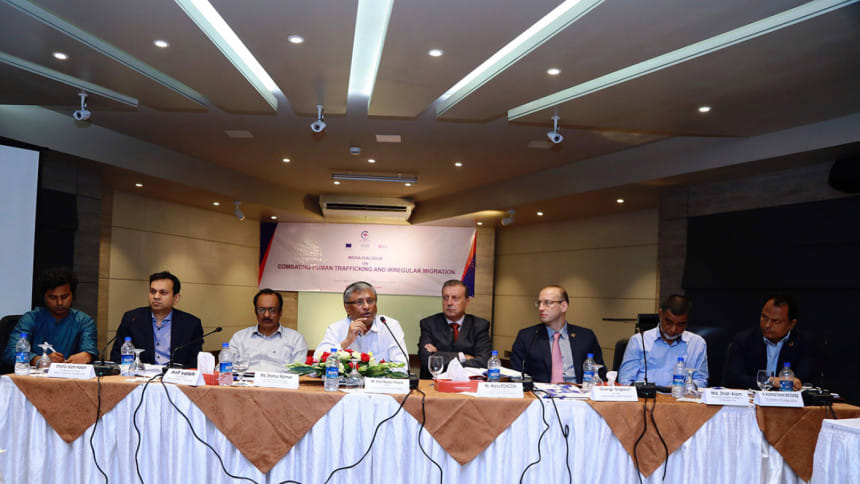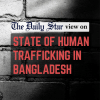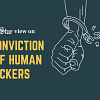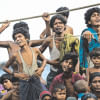Convictions far too few

Only 25 people have been convicted in cases over trafficking of some 7,840 victims since Bangladesh enacted the Prevention and Suppression of Human Trafficking Act in 2012.
Between February 2012 and June this year, police recorded 4,152 cases under the law. The cases involved 5,367 men, 1,638 women and 835 children, all of whom were victims of human trafficking at home and abroad, according to data from Police Headquarters.
Ahead of World Day against Trafficking in Persons today, migration experts and officials at a dialogue yesterday expressed serious concerns over the very low rate of conviction in such cases.
Brac Migration Programme with support from European Union (EU) and International Organization for Migration (IOM) organised the programme at the Brac Centre Inn in the capital's Mohakhali.
“The government was supposed to set up seven human trafficking prevention tribunals, but those are yet to be done,” Brac's Head of Migration Programme Shariful Islam said at the dialogue.
The Women and Children Repression Tribunals have now been designated for trials of human trafficking cases, he added.
“This culture of impunity is allowing crimes like human trafficking. If the perpetrators are not punished, people's rights cannot be protected,” said National Human Rights Commission (NHRC) Chairman Kazi Reazul Hoque, chief guest at the event.
Around 50,000 Bangladeshi girls are trafficked to or through India every year, according to a study by Indian Border Security Force.
Human trafficking in Bangladesh came under the spotlight during the Andaman crisis when mass graves of Rohingyas and Bangladeshis were discovered in the bordering areas of Thailand and Malaysia in 2015.
Besides this, the media has made various reports of human trafficking gangs operating in Libya and Iran who held Bangladeshis hostage for months and demanded ransom. In many instances, men and women who had gone abroad as job seekers were confined to rooms without any jobs or pay.
The NHRC chairman said Bangladesh has enacted rules, a law and a national plan of action on the prevention of human trafficking, but sadly the conviction rate is very low. In many cases, human trafficking is happening in the name of labour migration.
“The cases under the human trafficking prevention law must see fast disposal. We want justice for the victims,” he said.
Shah Alam, deputy inspector general (special investigation and intelligence) of the Crime Investigation Department (CID), said, “We failed to send a strong message to the human traffickers. They know they can get away with it and so, they still thrive.”
He said the CID is working to establish a mechanism to identify the main beneficiaries of human trafficking.
The home ministry's Additional Secretary (political and ICT) Shamsur Rahman admitted to the low rate of convictions, but blamed the lack of evidence against the traffickers for it.
IOM Chief of Mission Giorgi Gigauri said many young Bangladeshis are desperate to go abroad and eventually fall prey to traffickers.
“The root causes of human trafficking need to be addressed. There should be livelihood options and enough security for them at home, so that they don't feel the need to go abroad,” he said.
Asif Saleh, senior director of Brac, said they were working on ways to send workers abroad at a lower cost and establish a regional network to help the survivors of human trafficking.
Mario Ronconi, chargé d'affaires at the EU Head of Cooperation in Bangladesh; Mohammad Khorshed Alam Khastagir, DG (West Europe and EU) at the foreign ministry; independent researcher Asif Munier; migration expert Hasan Imam Shaon, among others, spoke at the event.

 For all latest news, follow The Daily Star's Google News channel.
For all latest news, follow The Daily Star's Google News channel. 







Comments